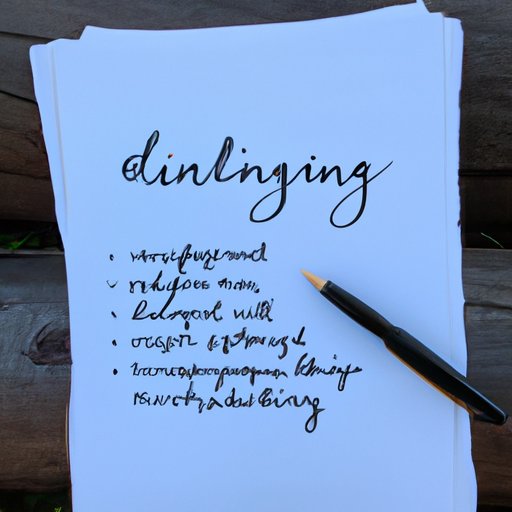Introduction
Disinheritance is a term used to describe when someone is removed from a will or inheritance. It can be a difficult experience for those affected, as it often comes as a surprise and can cause feelings of shock, anger, and betrayal. In some cases, it can even lead to depression and anxiety. However, there are ways to cope with the pain of being disinherited and move on with your life.
Seek Professional Counseling
One of the best ways to cope with being disinherited is to seek professional counseling. A qualified therapist can help you work through your feelings and develop strategies to manage them more effectively. They can also provide emotional support and guidance during this difficult time.
Benefits of Professional Counseling
Professional counseling can help you process your emotions in a safe and supportive environment. Your therapist can provide insight into your situation and help you find ways to cope with the pain and grief you may be feeling. They can also help you understand why you were disinherited and what you can do to move forward in a healthier way.
Finding a Qualified Therapist
It’s important to find a qualified therapist who is experienced in dealing with issues related to disinheritance. You can start by asking your primary care physician for referrals, or searching online for therapists in your area. Make sure to read reviews and check credentials before making a decision.

Develop a Healthy Support Network
Having a strong support network can be beneficial when coping with being disinherited. Reaching out to family and friends can help you feel less alone and provide an outlet for expressing your feelings.
Accessing Social Support
There are many ways to access social support. You can join online support groups, attend group therapy sessions, or simply reach out to people you trust to talk about your situation. Talking to others who have been through similar experiences can be especially helpful, as they may have valuable advice or insights to share.
Reaching Out to Family and Friends
It’s also important to reach out to family and friends who are not directly involved in the situation. Having someone to talk to who can offer an unbiased opinion can be invaluable. It’s important to remember that even though you may feel isolated, there are people who care about you and are willing to listen.
Practice Self-Care and Mindfulness
Self-care and mindfulness can also be beneficial when coping with being disinherited. Taking time for yourself to do things that make you feel good can help you manage stress and boost your mood.
Benefits of Self-Care
Self-care activities can help reduce stress and anxiety, improve sleep, and boost your overall wellbeing. Examples of self-care activities include taking a relaxing bath or shower, meditating, journaling, exercising, or engaging in creative pursuits such as painting or crafting.
Examples of Mindfulness Practices
Mindfulness practices such as yoga, tai chi, and qigong can also help you stay present and connected to the present moment. Other mindfulness activities include mindful eating, walking meditation, and breathing exercises. All of these activities can help you stay grounded and focused on the here and now.

Express Your Feelings Through Writing or Art
Writing or creating art can be an effective way to express your feelings about being disinherited. Writing can be particularly helpful, as it allows you to put your thoughts and feelings into words. Art can also be a powerful tool for self-expression and healing.
Writing as a Form of Expression
Writing can help you process your emotions and gain clarity on the situation. You can write in a journal, compose a letter to the person who disinherited you, or even write a story or poem. Writing can help you make sense of your feelings and give you an outlet for expressing them.
Benefits of Art Therapy
Art therapy is another form of self-expression and healing. Creating art can help you express emotions that may be difficult to put into words. It can also be a helpful distraction from negative thoughts and feelings. Drawing, painting, sculpting, and other forms of art can be a powerful tool for processing complex emotions.
Reconnect With Nature
Exploring the outdoors can be beneficial when coping with being disinherited. Spending time in nature can help you feel more connected to the world around you and provide a sense of peace and calm.
Exploring the Outdoors
Taking a walk in the park, going for a hike, or spending time at the beach can be therapeutic. You can also take a trip to explore a new city or visit a nearby nature preserve. Any activity that allows you to connect with nature can help you find solace and peace.
The Benefits of Nature
Nature has been shown to have a calming effect and can help reduce stress and anxiety. Exploring the outdoors can also help you feel more connected to the world around you and provide a sense of perspective. Taking the time to appreciate the beauty of the natural world can help bring a sense of renewal and hope.

Reflect on the Positive Aspects of the Experience
It’s important to reflect on the positive aspects of the experience, even if it is difficult. Looking for moments of gratitude and joy can help you focus on the good things in life.
Finding Gratitude
Gratitude can help you reframe the situation and find meaning in the experience. Even small moments of joy or appreciation can provide a sense of comfort and hope. Taking the time to recognize the positive aspects of your life can help you find balance and peace.
Learning From the Experience
It’s also important to reflect on the lessons you can learn from the experience. What did you learn about yourself? About your relationships? What changes can you make moving forward to ensure a healthier future? Taking the time to consider these questions can help you gain perspective and create a new path forward.
Focus on Creating a New Legacy
Finally, focus on creating a new legacy for yourself. Setting new goals and finding meaning in life can help you move on from the experience and create a life that is meaningful and fulfilling.
Setting New Goals
Setting new goals can help you move forward in a positive direction. Consider what goals you would like to achieve in the next few years and create a plan for achieving them. This can help you focus on the present and the future, rather than dwelling on the past.
Finding Meaning in Life
Finding meaning in life can also be beneficial when coping with being disinherited. Take the time to explore your passions and find ways to use your talents and skills to make a difference in the world. Doing something that brings you joy and fulfillment can help you create a new legacy for yourself.
Conclusion
Being disinherited can be a difficult experience, but there are ways to cope with the pain and move on with your life. Seeking professional counseling, developing a healthy support network, practicing self-care and mindfulness, expressing your feelings through writing or art, reconnecting with nature, reflecting on the positive aspects of the experience, and focusing on creating a new legacy can all be beneficial when coping with being disinherited. It’s important to remember that although the experience may be painful, there is always hope for a brighter future.
(Note: Is this article not meeting your expectations? Do you have knowledge or insights to share? Unlock new opportunities and expand your reach by joining our authors team. Click Registration to join us and share your expertise with our readers.)
